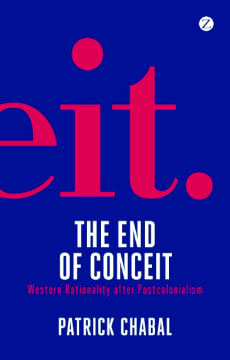
Additional Information
Book Details
Abstract
In this radical new book, Patrick Chabal reveals how the future of the West is now inextricably linked to that of the non-West. The rise of the economic power of China and other Asian countries as well as urgent environmental issues now force the West to think in new ways about how to best face the future. This is an issue which runs far deeper than present debates on the decline of the West might suggest. The book argues that the postcolonial challenge, from regions such as Asia, Africa, Latin America and the Middle East, as well as the influence of citizens of non-Western origins now living in the West have combined to expose the limits of Western rationality - that is, the theories and concepts we currently use to understand and act upon the world.
Discussing such provocative questions as 'Is it a good idea to build mosques in Europe?' and 'Is Beckham the new black icon?', Chabal explores the growing failure of Western social thought to explain many of our most pressing domestic social and economic issues. He also discusses contentious issues in international relations, such as the spread of democracy and the protection of human rights. He concludes that, ultimately, what the West needs is not more and better theory but an entirely new way of thinking - one that will put an end to its current deep-seated conceit.
Patrick Chabal was professor in the department of history at King’s College London. His books include Africa: The Politics of Suffering and Smiling (2009), Culture Troubles: Politics and the Interpretation of Meaning (2006), and Africa Works: Disorder as Political Instrument (1999). He died in 2014.
'The End of Conceit is a treatise on the grand failure of Western conceit - even with itself, let alone the irresistible plurality of the world rising around it. Patrick Chabal has written a most elegant denunciation and a most provocative and persuasive pathway to a more egalitarian global future.'
Stephen Chan, School of Oriental and African Studies, author of The End of Certainty
'A brave book and a timely one. Well-organized, lucid, incisive, it offers penetrating criticisms of the assumptions of governments, academics and ordinary Westerners. Beginning with current examples of political and social problems, Patrick Chabal helps his readers to "think beyond theory".'
Peter Burke, Emmanuel College Cambridge
'The End of Conceit is a timely book written with insight, commitment, and grace. Studied without being sophistic, deeply personal without being sentimental, it challenges still firmly held prejudices about the rationality of the human and social sciences. Most importantly, it offers a compelling argument that thinking through traditions of the non-Western world can provide critical perspectives from which Europe might reflect upon its contemporary cultural-political predicaments. Patrick Chabal's is a distinctive intelligence from which we have a great deal to learn.'
David Scott, Columbia University
'This is an important book and is to be highly recommended.'
Roger Mac Ginty, in The Round Table: The Commonwealth Journal of International Affairs
Table of Contents
| Section Title | Page | Action | Price |
|---|---|---|---|
| About the author | ii | ||
| Contents | v | ||
| Preface | vii | ||
| Introduction | 1 | ||
| West and non-West | 4 | ||
| Western rationality and postcolonialism | 13 | ||
| Rationality, theory and thinking | 23 | ||
| ONE The problem | 35 | ||
| At home | 39 | ||
| Abroad | 76 | ||
| TWO Identities | 114 | ||
| Who are we? | 119 | ||
| Who are the ‘others’? | 132 | ||
| Why is the West more ‘advanced’? | 147 | ||
| Why is the non-West a ‘threat’? | 162 | ||
| THREE Ideas | 178 | ||
| Individual | 186 | ||
| Society | 191 | ||
| Freedom | 197 | ||
| Faith | 204 | ||
| Market | 215 | ||
| Change | 222 | ||
| FOUR Interpretations | 235 | ||
| To think is to theorise | 247 | ||
| To theorise is to explain | 261 | ||
| To explain is to act | 275 | ||
| To act is to think (again) | 290 | ||
| EPILOGUE Three questions | 316 | ||
| Secularism | 318 | ||
| Human rights | 321 | ||
| Sovereignty | 328 | ||
| Bibliography | 336 | ||
| Index\r | 365 | ||
| About Zed Books | 370 |
